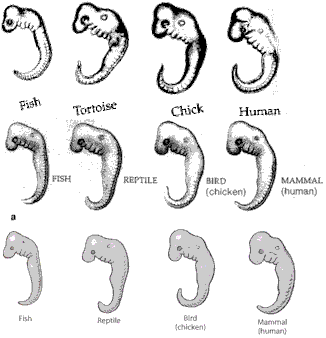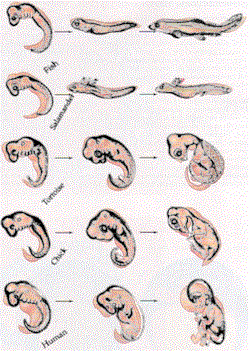Haeckel's
Embryos
Another
Example - Proposed
2004 Textbooks Continue to Propagate the Fraud
of Haeckel’s Embryos and Embryonic
Recapitulation
The
saga of the “Haeckel” embryos continues.
Briefly, a German embryologist name
Ernst Haeckel, overzealous in trying to
support Charles Darwin in the late 1800’s,
published what he said were drawings of
embryos.

Fig. 1 - Haeckel, 1874 (top) – Starr & Taggart, proposed 2004 (middle) - Raver, proposed 2004 (lower) [both 2004 are in color in the books]
While some publishers have made
substantial improvements from prior years’
editions, this fully debunked idea of “embryonic
recapitulation” or
“ontogeny recapitulates phylogeny” stems
essentially from drawings originally
constructed by Haeckel in the late 1800's.
He originally posited that as embryos
develop in the womb or egg, they essentially
retraced their supposed evolutionary history.
Note
that in the late 1800’s, embryologists were
already aware of the faked drawings, and
openly accused Haeckel of scientific fraud.
More recently, embryologists have
discovered that the idea of embryonic
recapitulation is also untrue.
Yet, Darwinian thought police still
maintain that it is OK to use embryos in the
books. The
scientists disagree.
To quote Harvard’s late
atheist-Marxist-evolutionist Stephen J. Gould,
perhaps one of the most outspoken proponents
of the ‘punctuated equilibrium’ flavor of
evolution until his recent death, said:
"We
do, I think, have the right to be both
astonished and ashamed by the century
of mindless recycling that has led to the
persistence of these drawings in a large
number, if not a majority, of modern
textbooks."
[emphasis added]
It
is not merely the faked drawings that are the
problem, but the whole concept of embryology
‘proving’ evolution that is wrong.
(Most publishers have NOT yet addressed
this, even if they have removed or changed Haeckel’s
drawings).
 Fig.
2 - From Biology Sixth Edition (2004,
proposed) by Raven and Johnson (color),
overlaid with Haeckel’s 1874 drawings (in
black)
Fig.
2 - From Biology Sixth Edition (2004,
proposed) by Raven and Johnson (color),
overlaid with Haeckel’s 1874 drawings (in
black)
Please
ask your friends and family to help.
If you have a child or grandchild from
the age of 3 to 16, this decision will affect
them and you.
The books that are approved will likely
be used in the